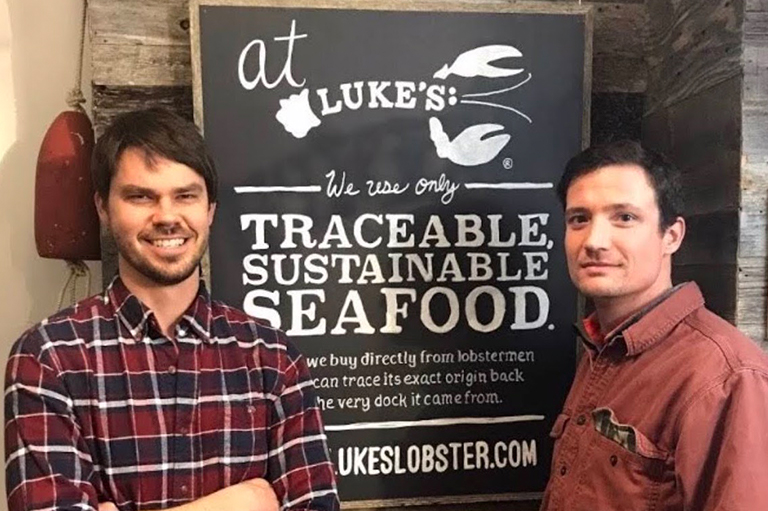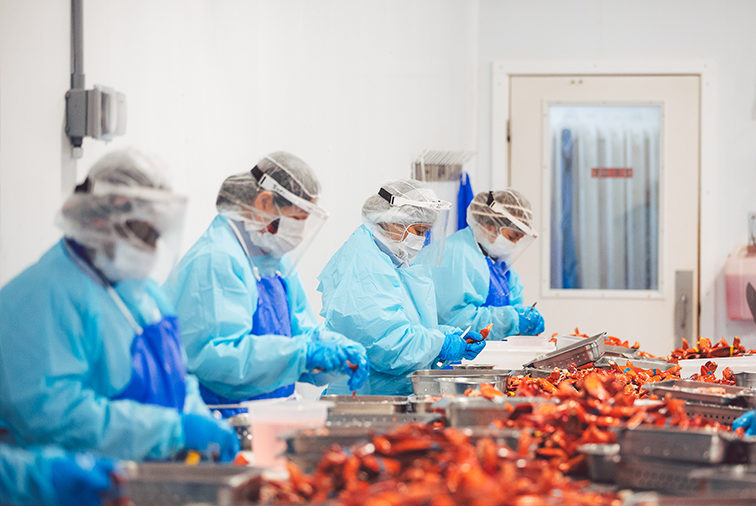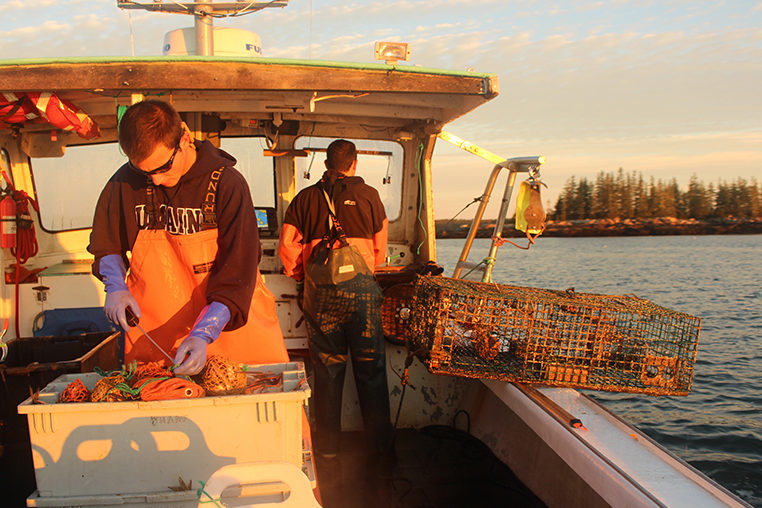BACKGROUND
In the last decade, there has been a growing interest among consumers in ensuring that seafood is sustainable and locally sourced. More recently, there has been increasing focus on ensuring that businesses do right by their community and work toward social justice and inclusion. These values are often summed up as the triple bottom line, or ensuring your business plan is good for people, the planet, and profits. However, the triple bottom line concept can often be hard to define, and too many businesses talk the talk without necessarily walking the walk of these values.
Luke’s Lobster is a company that has a track record for thinking outside the box in the lobster industry. Growing up in Cape Elizabeth, co-founder Luke Holden saw his father juggle small profit margins as a lobster processor. When Holden started a group of lobster-themed restaurants and a line of seafood products of his own, he wanted to find new ways to control the variables and create more value for his products. He and co-founder Ben Conniff set out to accomplish this goal through a process called vertical integration; the pair invested in lobster meat processing and joined a fishing co-op to have a direct relationship with their suppliers.
The triple bottom line is one of the reasons why Luke’s Lobster elected to work toward B Corp certification in 2017. This certification process, overseen by B Lab, requires companies to prove and document that every step of the process of bringing a product to consumers is done with these values in mind. After a year of work, Luke’s Lobster gained certification and has been championing the process ever since in public forums and the media.
HOW IT WORKS
Luke’s Lobster was already positioned well for B Corp certification in some aspects of their business; they knew the supply chain well, and suppliers already had to document their catch for regulators. In addition, the North Atlantic lobster fishery is considered one of the most sustainable in the world. However, the company better documented these positive aspects of their business and created processes to ensure they would work toward diversity and inclusion. In 2021, as the company goes up for recertification, they are working on improving their B Corp score. For example, they are examining the process of decarbonizing their products by investing in energy efficiency and renewable energy projects.
The work the company has done to think about their suppliers and their infrastructure helped Holden and Conniff think about how to approach the massive disruption of the COVID-19 pandemic, says Conniff. When the restaurants closed, he and Holden didn’t want to leave their suppliers without revenue. With the help of a grant from the Island Institute, Luke’s Lobster has launched an e-commerce site to ship seafood direct to consumers, thus keeping the supply chain connected.
Conniff says that the B Corp certification process takes substantial time and resources. However, he said it helps a business draw a clear line around the community-minded values it stands for, and that helps a company maintain those values when the going gets rough.

Q&A WITH BEN CONNIFF, CHIEF INNOVATION OFFICER, LUKE’S LOBSTER
Why did Luke’s Lobster decide to go for B Corp certification?
It must have been around the Super Bowl in 2017 when we saw a big restaurant chain list all of our talking points for a Super Bowl ad. We thought it was really frustrating that they didn’t have to back their claims up with any real information, because words like “sustainable” aren’t regulated. So, we thought our customers needed another proof point to help them understand what sets us apart from other restaurant companies.
We started working on B Corp certification, and it’s a major project. It requires producing hard evidence of every claim you make about what your company does for your employees, for the environment, for your community, and doing enough of all those things verifiably that you can score a really high number of points that’s required to actually become a certified B Corp.
Why was Luke’s Lobster well positioned for B Corp certification?
From Day 1, we’ve been committed to only serving sustainable seafood and to working directly with our stakeholders in the lobstering community and in coastal communities to make sure that we’re returning maximum value to our suppliers. We’ve also put a huge emphasis on treating our team, and the communities around each of our restaurants, the way that we would want to be treated. We do have a strong environmental focus on the sustainability of fisheries and climate change, as well as a social focus on our team, our community, and the broader landscape of social justice.
How do you ensure the B Corp certification process is successful internally?
Don’t get some great idea and just run down that road without bringing all your internal stakeholders in and getting them aligned towards why you want to make that shift, and what it’s going to do for the business. The last thing you want to do is try to make a change like this in your organization unilaterally. If you go through the process and you fail, you really derail future desire to do something like this, because the folks around you and your team are going to be totally disillusioned.
How does a company like Luke’s Lobster benefit from going through the process for B Corp certification?
When you see a company that’s willing to step up to the plate and get certified, it signifies a company that really has their house in order and has permanent written policies geared towards achieving their values. The company is actually tracking and measuring what they do to make sure that the consequences that they intend are the consequences that they actually get.
B Corp certification means that you actually spent an egregious amount of time going through an assessment bit by bit, measuring every single impact that your business had, and then had to produce the paperwork to prove every one of those claims that you made, so that you can be verified, scored, and officially stamped. You really cannot become a Certified B Corporation without absolutely producing the evidence that you’re doing good for the world, and that is really why it is so much more than a marketing ploy.
On the supplier’s side, the fishermen know that we’re devoted to more than just lining our own pockets. Everything is transparent, everything is out on the table, and we’re able to really benefit from knowing exactly what to expect from our suppliers, and they know what to expect from us.
On the other side, on the buyer front, Whole Foods is one of our best customers, and they are serving what their consumers are demanding. The reason that they latched onto us as their lobster provider was our B Corp status, and our commitment to doing environmental and social good. That ultimately led to us becoming their Supplier of the Year in 2018.
RESOURCES
The interview above has been edited for clarity and length.



